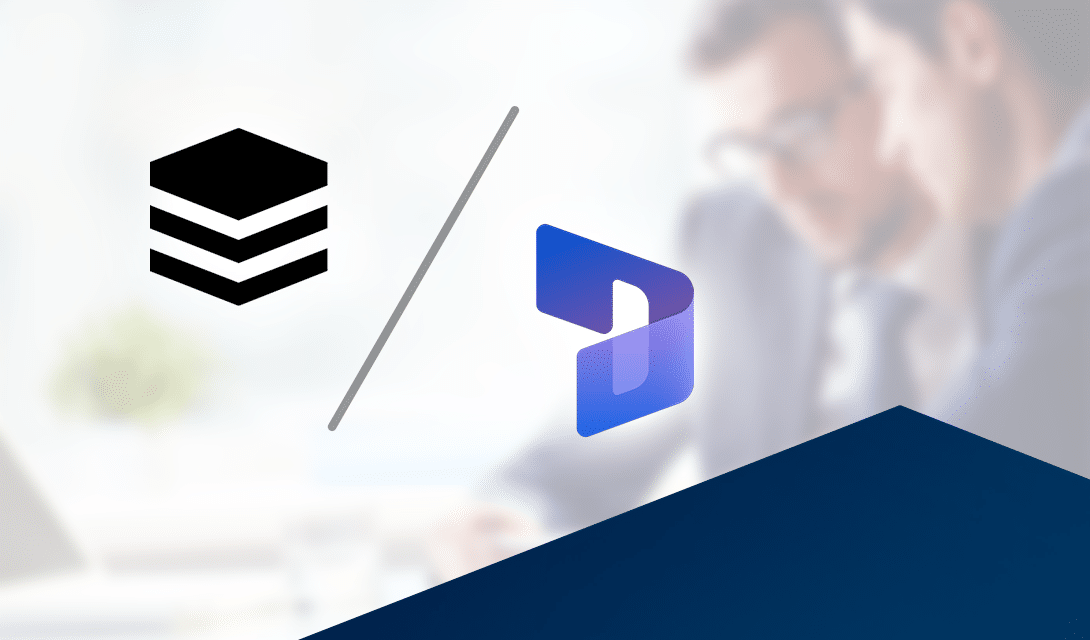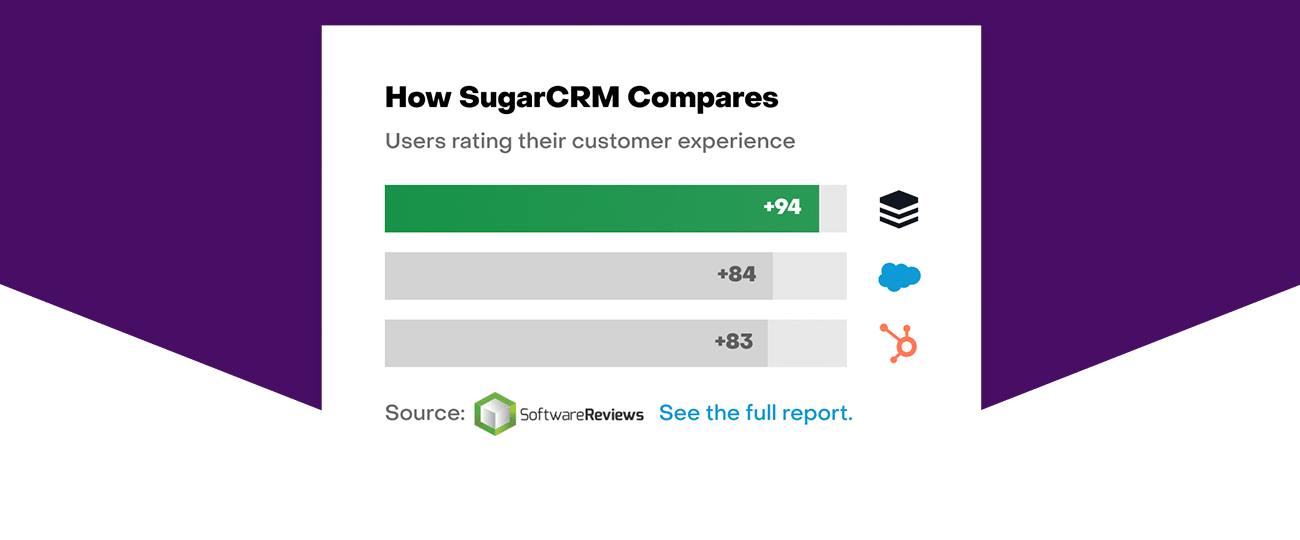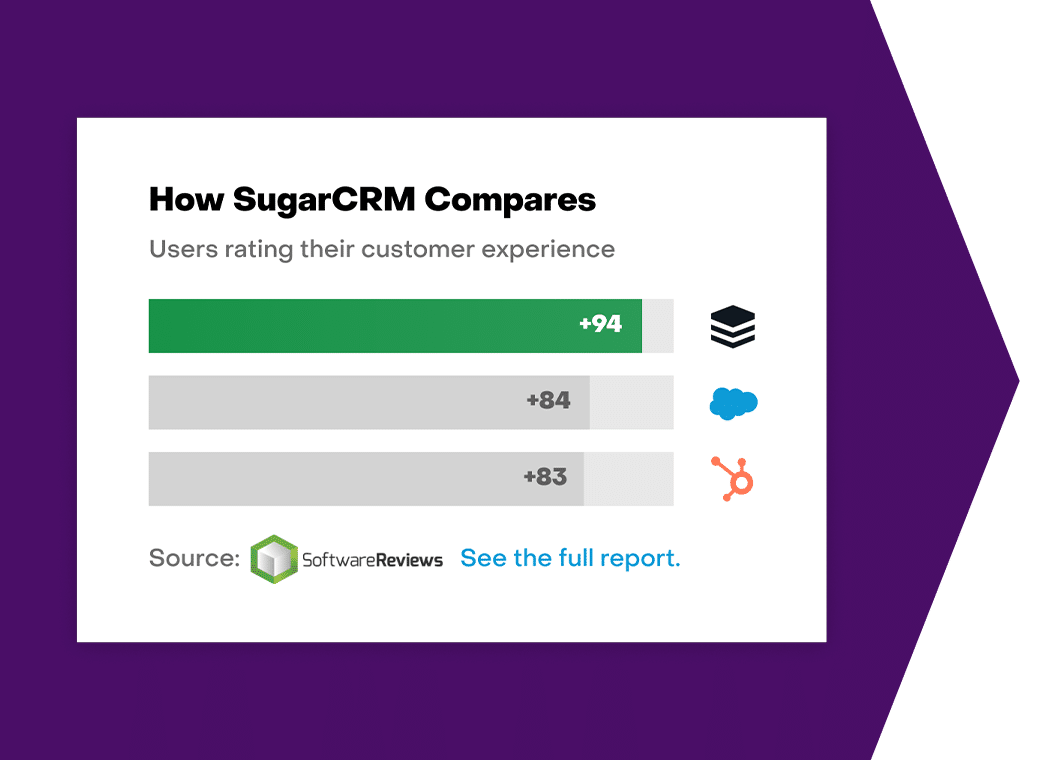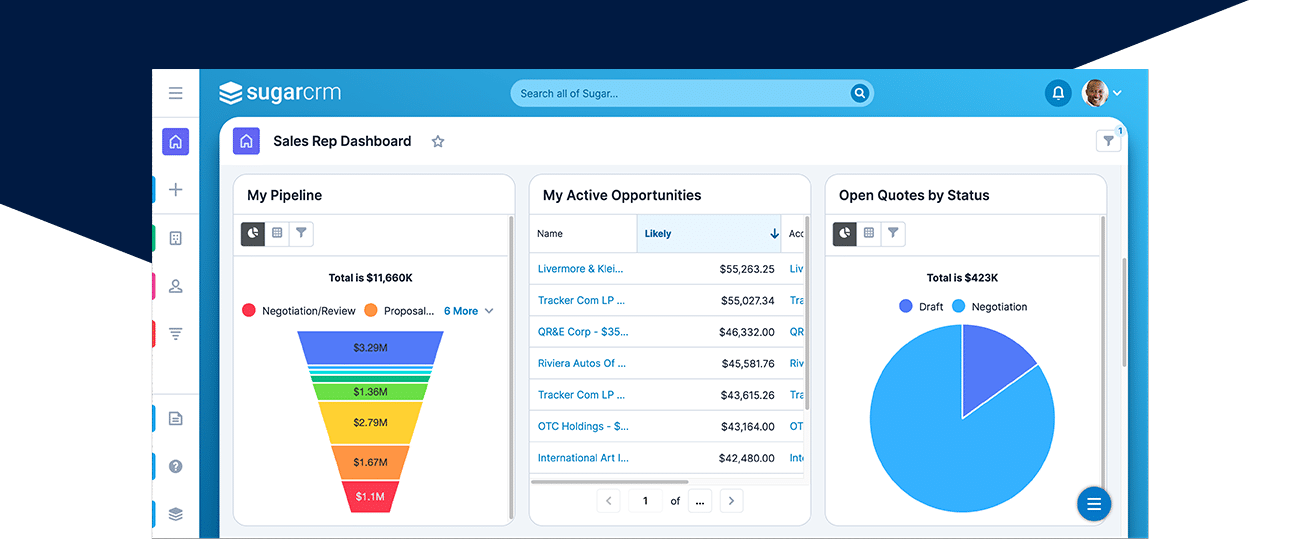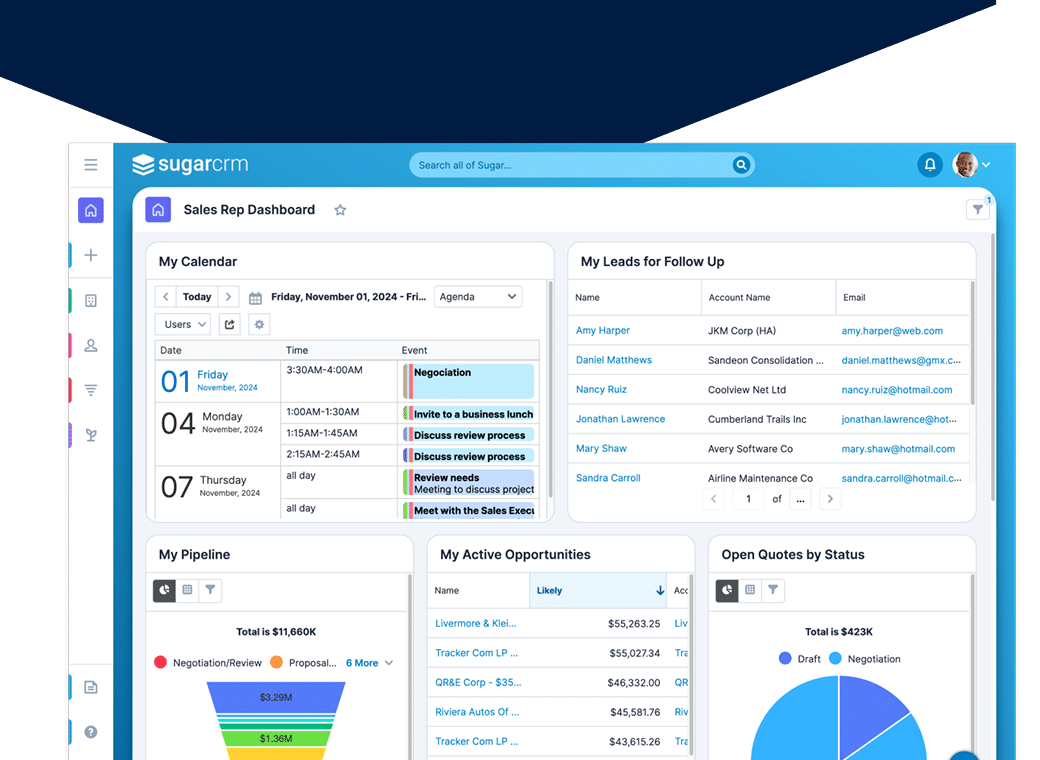SugarCRM vs. Microsoft Dynamics: A Guide to Choosing the Best Option for Your Company
In this blog post, we’ll dive into the key differences between SugarCRM and Microsoft Dynamics 365. While both platforms have their strengths, each caters to different types of organizations.
Although Microsoft Dynamics shares similar sales and marketing capabilities, like customer journey management, salesforce automation, and customization options, the main differences between the two solutions lie in their respective price points and integration capabilities.
Simply put, Microsoft Dynamics is a good fit for large enterprises with a dedicated IT team to manage the CRM and a large budget, and that don’t mind platform lock-in. SugarCRM, on the other hand, is best suited for sales-led businesses that need easily configured workflows, advanced integrations, AI capabilities, and strict security compliance at affordable prices.
What we'll Cover:
Microsoft Dynamics: What’s Included?
Microsoft Dynamics is an enterprise-grade CRM solution. It is better suited for large enterprises and businesses already integrated into the Microsoft ecosystem and that prefer to keep their capabilities within this environment.
Dynamics has extensive features, AI-powered insights, and seamless integration with Microsoft Office 365, Teams, and Azure. These integrations make it a good option for companies deeply integrated with the Microsoft ecosystem that don’t mind platform lock-in. Industries like healthcare, finance, and retail often opt for Dynamics’ industry-specific solutions.
Dynamics offers a range of features designed to enhance productivity and streamline processes. These include lead tracking and automated scoring to prioritize prospects, opportunity management for advancing deals, predictive tools for lead qualification, opportunity scoring, and revenue forecasting. Dynamics’ mobile app solution keeps sales teams productive on the go, while process automation reduces repetitive tasks. Dynamics also features customizable dashboards that provide insights into sales performance and trends, empowering businesses to drive success.
However, it’s worth mentioning that for mid-sized to large companies looking to scale further and remain flexible from a tech standpoint, integration limitations to the Microsoft ecosystem might become a costly and technologically complex adventure.
SugarCRM: What’s Included?
SugarCRM is an excellent fit for businesses that value simplicity, no-code configurability, affordability, and cost predictability.
Sugar is especially well-suited for mid-size to large companies looking to scale quickly. The CRM is a a good fit for companies seeking a highly adaptable solution without unnecessary complexity but still want to benefit from machine learning and AI-driven models.
Sugar CRM enhances team collaboration and productivity through integrated communication, shared customer data, and mobile accessibility. It leverages AI-driven insights for lead, pipeline, and opportunity management, enabling smarter prioritization and follow-ups. Sugar’s advanced forecasting, analytics, and intelligent account management features offer advanced visualizations and role-specific dashboards. Sugar’s capabilities also include easy to configure workflows and guided selling tools. All these help cross-organizational teams standardize processes and optimize sales strategies. Its advanced document and quote management features and capabilities ensure seamless access to critical materials. With its flexible, configurable platform mobile app, Sugar CRM offers a comprehensive solution for modern business needs.
Key Differences Between SugarCRM and Microsoft Dynamics
While SugarCRM offers a straightforward and transparent pricing model, Dynamics is more complex and costly. Microsoft offers separate solutions for very specific operations, such as human resources, customer insights, and communications, which can lead to growing costs and IT complexity.
Sugar allows many third-party integrations, which is not the case with Dynamics. SugarCRM also provides several of the solutions that Dynamics does, but in one complete package. If you’re concerned about platform lock-in and flexibility, SugarCRM is the better choice. Sugar UI is also simpler to navigate, requiring less clicks and straightforward to configure to unique business requirements.
But let’s dive in even deeper:
1. Customization and Flexibility
Microsoft Dynamics
Dynamics offers extensive customization options but requires deep technical expertise. Businesses can build tailored workflows and applications with tools like Power Automate and Power Apps.
However, its complexity and platform lock-in might deter many companies without dedicated IT teams, or that want to build a lean and flexible tech stack.
SugarCRM
Sugar excels in flexibility and ease of configuration. Businesses can configure almost every platform aspect without requiring a team of dedicated IT developers, with drag-and-drop customization options, workflows, and custom fields. It’s particularly advantageous for companies with niche needs or that value flexibility and ease of customization.
Best Fit
- Microsoft Dynamics: Large enterprises with dedicated IT departments that can work exclusively on configurations and integrations.
- SugarCRM: Mid-sized to large companies seeking user-friendly configurations and flexibility.
2. Integration Capabilities
Sugar is a strong choice for companies with established tech stacks that need a CRM capable of aggregating data from multiple sources without being locked into a certain tech ecosystem and for enterprises with a legacy tech stack.
On the other hand, companies that prefer to limit their integrations to the Microsoft ecosystem might find Dynamics better suited for them.
If you want to avoid platform lock-in, you might find Sugar a better option.
Microsoft Dynamics
Microsoft Dynamics integrates with the Microsoft ecosystem, including Office 365, Teams, and Azure. It also supports a few third-party integrations, but its strength is enhancing businesses already leveraging Microsoft products in their daily operations.
By limiting companies’ integration capabilities to the Microsoft ecosystem, Dynamics is not an excellent fit for mid-sized companies that are rapidly scaling and need more flexibility as they grow.
SugarCRM
Sugar supports numerous third-party integrations, including marketing tools like Mailchimp, analytics platforms like Google Analytics, and even tools in the Microsoft ecosystem: Microsoft Dynamics GP, Microsoft Teams, Microsoft Teams Phone, and Outlook.
Sugar’s integration capabilities allow companies to integrate with both modern and legacy systems, including a wide array of ERPs (Epicor, SYSPRO, SAP, Sage, Intuit QuickBooks, and many others), connecting back-office systems with front-office systems to get a unified view of all data.
Best Fit
- Microsoft Dynamics: Organizations heavily invested in Microsoft products with no issues with platform lock-in.
- SugarCRM: Businesses requiring diverse third-party integrations with legacy and ERP tools and modern tech solutions, including Microsoft products.
3. Total Cost of Ownership (TCO)
While Microsoft Dynamics and SugarCRM have similar capabilities, Microsoft Dynamics is pricier than Sugar, making it a better fit for large enterprises with large SaaS budgets:
| Capabilities | Sugar Sell Premier | Microsoft Dynamics Sales Premium |
| Account & Contact Management | Yes | Yes
|
| Lead & Opportunity Management | Yes
|
Yes
|
| Quote Management | Yes
|
Yes
|
| Activity Management | Yes
|
No |
| Intelligent Account Management | Yes
|
No |
| Reporting & Analytics | Yes
|
Yes, but limited to exporting to Excel and analytics with Microsoft Power BI. |
| Collaboration & Teamwork | Yes
|
No |
| Basic Support | Yes
|
No |
| Microsoft 365 Integrations | Yes | Yes |
| Smart Guides | Yes | No |
| Custom Apps Capabilities | Yes | Yes |
| LinkedIn Connector | Yes | No |
| Advanced Sales Force Automation | Yes | Yes |
|
PRICE |
$135/user/month | $150/user/month |
Microsoft Dynamics
Microsoft Dynamics is known for being a costly solution. For example, Dynamics 365 Sales Premium costs $150/user per month (see table above).
Microsoft has many targeted integrations that serve specific processes, including a whole suite to cater to all organizational processes and operations (e.g., finance, sales, human resources, operations, smart guides, etc.). However, each solution must be paid for individually.
Besides costs, including licensing, implementation, and ongoing maintenance, Microsoft Dynamics’ complexity might make it a better-suited solution for companies with an in-house IT department and a generous budget.
SugarCRM
Sugar offers a lower upfront cost and competitive pricing for mid-size to large businesses. The Sugar Sell Premier package costs $135/user per month.
Apart from standard sales automation features, Premier users also benefit from sales intelligence capabilities, advanced forecasting & analytics, productivity tools, and enhanced support. Features like case management, bug tracking, intelligent lead prioritization, revenue intelligence, generative AI, sentiment analysis, chat and chatbot capabilities are also included.
Sugar also reduces expenses by allowing in-house no-code configurations through drag-and-drop workflow design and custom fields. It is perfect for rapidly growing companies that want to scale without a hefty scaling fee.
Best Fit
- Microsoft Dynamics: Businesses with larger budgets for specific modular applications and an in-house IT department.
- SugarCRM: Rapidly growing companies that want to scale without hefty fees.
4. Sales and Marketing Capabilities
Microsoft Dynamics
Microsoft Dynamics offers advanced sales and marketing automation features powered by AI and machine learning. The Dynamics solutions leverage predictive analytics, feature customer journey mapping capabilities, and provide real-time sales insights.
However, companies that aim to get complete sales and marketing capabilities must pay a hefty fee. Dynamics 365 Sales Premium costs $150/user per month, while Dynamics 365 Customer Insights starts at $1000 tenant/month. Companies must pay another $65/user per month for other capabilities, such as smart guides.
SugarCRM
Sugar also offers robust sales automation and account-based features, which makes it a great contender to Microsoft Dynamics when it comes to sales and marketing capabilities.
Sugars and sales-i‘s AI and ML-powered revenue intelligence and sales intelligence features are priced more affordably, costing Sugar Sell Premier $135/user per month. Sugar Sell Premier includes many premium features and capabilities, such as smart guides, a LinkedIn connector, geo-mapping, and enhanced support without additional costs.
Sugar also offers a dedicated marketing automation solution, Sugar Market, starting at $1000 per month for 10,000 contacts. This solution integrates well with external marketing tools.
However, its most significant strength is helping sales-driven companies manage complex operations involving numerous stakeholders.
Best Fit
- Microsoft Dynamics: Companies with large budgets for sales and marketing automation solutions.
- SugarCRM: Sales-led organizations with complex sales cycles that need AI and ML-powered capabilities at affordable prices.
5. Data Security and Compliance
Microsoft Dynamics
Dynamics leverages Microsoft’s enterprise-level security protocols and role-based access controls, including advanced encryption, GDPR compliance, and ISO 27001 certification.
However, for enterprises with complex security concerns and seeking a complete on-premises solution, it’s worth noting that Microsoft offers on-premises deployment only for Dynamics 365 Finance + Operations.
SugarCRM
SugarCRM offers customizable, high-level data protection with extensive access controls and compliance certifications. As such, it is better suited for organizations in deeply regulated industries that need robust security measures.
Sugar’s role-based access controls allow admins to define user permissions control and data access based on job roles. Sugar’s SOC 2 Type II and ISO 27001 certifications show its commitment to data protection and compliance with international standards, such as EcoVadis.
Sugar is a preferred vendor for enterprises with stringent security concerns as it offers a full on-premises deployment option.
Best Fit
- Microsoft Dynamics: Globally distributed businesses and those comfortable with cloud or hybrid solutions
- SugarCRM: Global enterprises in highly regulated sectors that need on-premises deployment for stringent security and data protection reasons.
6. Support and Customer Service
Microsoft Dynamics
Microsoft Dynamics provides multiple support tiers, including premium enterprise support. However, the learning curve might involve additional training and consultancy due to its complexity.
SugarCRM
Sugar’s high quality, hands-on customer support is especially valuable for companies that demand specific guidance for intricate CRM use cases, starting from the implementation and customization phases.
Best Fit
- Microsoft Dynamics: Businesses requiring in-depth technical support.
- SugarCRM: Companies that prioritize accessible and straightforward assistance.
Conclusion
So, which CRM should companies choose? Whether you should choose Microsoft Dynamics and SugarCRM depends on your budget, business size, and legacy tech stack.
Microsoft Dynamics is a good option for large enterprises with large budgets and established IT departments. It’s also a good fit for companies with no issues with platform lock-in and seeking seamless integration with the Microsoft ecosystem, being a module in a wider stack of applications which limits long-term flexibility and applicability.
On the other hand, SugarCRM is a better fit for sales-led businesses that need customized workflows, advanced integrations, AI capabilities, and strict security compliance needs at affordable prices. Besides, SugarCRM is heavily focused on CRM with continuous investment and innovation.
If your business is looking for pureplay CRM, Sugar is a stronger, and more flexible, future-proof option.
All that being said, understanding your company’s unique profile and needs allows you to select the CRM solution that aligns with your goals and enhances your operations.
Ready to discover other reasons why companies choose SugarCRM? Read Nucleus Research’s: Why Manufacturers Choose SugarCRM Analyst Report.

